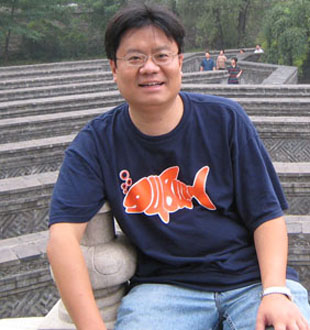| Future Students | Students | Scholars & Faculty | Alumni & Global Community | Donate |
Auburn Professor Improves Food Safety at Home and Abroad
AUBURN – Not every professor would be willing to take a group of students to the other side of the globe for a two-week class, especially if the trip was scheduled for almost the entire winter break.
But not every professor is Auburn's Yifen Wang, who teaches in Auburn's Biosystems Engineering Department and serves as an affiliate professor in the Fisheries and Allied Aquaculture Department. Thanks to a United States Department of Agriculture grant he was able to take six students to Shanghai, China, to study how the Chinese government handles fish and seafood processing and food safety.
Wang, a native of Shanghai, said the three-credit-hour Fisheries 5650/6650 class involved 45 hours of classroom instruction and four major field trips over the course of the class's time in China.
"One (field trip) was to the Shanghai FDA. It's very important to let the students know how Chinese people control their food safety," Wang said. "Another trip went to the import and export inspection bureau. It's also very important.
"The third one is what we call over here the USDA. Over there it is called the Ministry of Agriculture. They have several state-level laboratories. We visited their Shanghai branch laboratory. It is a very, very modern, state-run laboratory. It's kind of like a technical service for food testing and food sampling.
"On the fourth trip I brought students to a processing plant and let them see part of the food that gets exported to the United States. They will see how the food products are produced over there."
This will not be Wang's only experience working with the Chinese government. During the years leading up to the 2008 Beijing Summer Olympics, he served as part of an international and domestic food safety board.
"We just helped them make up their food safety plan and also helped to make a plan in case some food safety problem occurred and how to handle it," Wang said. "We also helped them establish several systems such as how to pick the (food) suppliers and how to manage the supply chain."
Besides the fisheries class, Wang teaches two other classes. One is processing engineering for biosystems, which discusses operations to process biological materials such as drying, freezing, separating biological materials and transporting the materials in either solid or liquid form.
The other class is called waste management. The class studies how to break down potentially harmful or unwanted substances in addition to studying water treatment. Wang said, "For example, we have chicken houses or swine units or units for cows. You need to clean those houses. After that you have to treat the water before you dispose of it back into the public water system."
Wang's research further explores the areas of food processing and food safety. A few examples include the treatment of both the coloring and taste of catfish produced for consumption, developing natural preservatives to prolong the shelf life of seafood, using radio frequency chips to trace food through the supply chain to enhance food safety and using a natural element found in algae to combat childhood obesity.
Wang came to Auburn as a professor in 2004 after earning degrees from the University of Washington and Washington State University. He chose Auburn because of its land-grant university status and the resources that offers in his area of expertise; the warm weather, which is similar to Shanghai's; and the lower cost of living as compared to universities in more urban areas.
He also likes the direction Auburn's president, Jay Gogue, has taken the university since his appointment in 2007. "This university, after changing to president Jay Gogue, really pushed the international programs and exchanges," Wang said. "It's a good thing for all the faculty and staff and students especially for those forming international connections."
One of Wang's goals in the coming year is to begin an international academic exchange with some Korean universities for Auburn students to spend a semester in South Korea and for South Korean students to spend a semester in Auburn.
When Wang has spare time, which he admits is not often, he enjoys traveling both regionally and internationally with his wife, 11-year-old son and eight-year-old daughter. Before the winter break, they enjoyed a weekend trip to Panola Mountain State Park near Atlanta and last summer they spent several weeks traveling throughout southern Europe and northern Africa.
During Wang's future travels, the cuisine he samples may be enhanced by the processing and safety procedures he develops.
Last Updated: April 11, 2013





